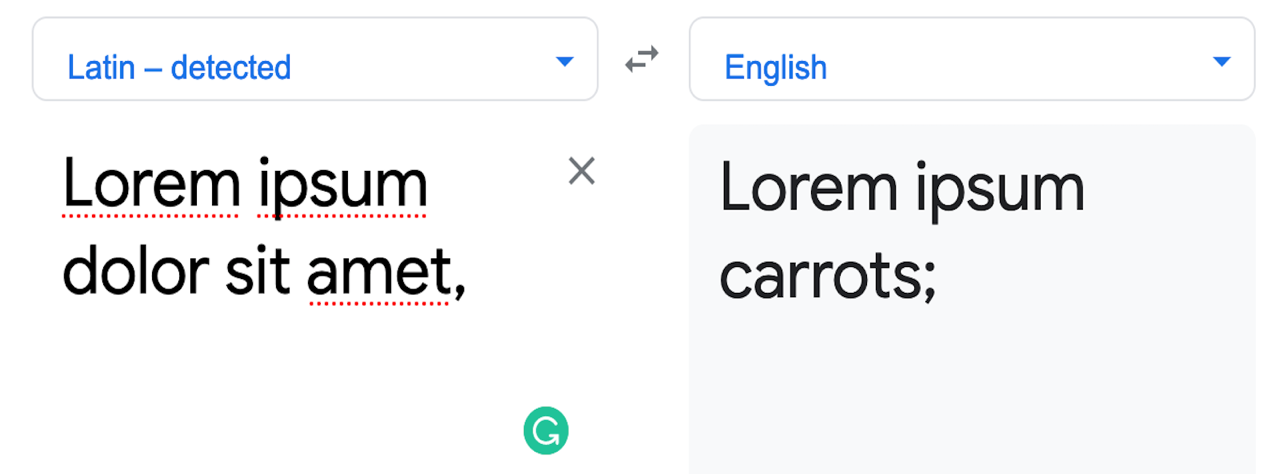Lorem ipsum dolor sit amet…
No dear reader, don’t be alarmed!
That is not some placeholder text left behind by our designers by mistake. These are the first words of this editorial because today, I want to talk about this seemingly meaningless phrase that even Google Translate refuses to give meaning, as you can see in this screenshot.

So why am I talking about it?
Firstly, it is the most used sentence in the history of humanity. Ok, not the most ‘used’ but the most displayed/printed for sure. If you have ever made a PowerPoint deck or used an MSWord template, you must have seen it. It is the standard placeholder text commonly used to illustrate the visual form of a document without relying on meaningful content. It is believed that it gives a fair idea of how the text will ‘look’ once it is finalized. It has been used in advertising since the 1960s, but its origins go way back to the 1st Century BC. And here we are, wasting gallons of ink every day on a sentence that no one is even bothered to ask the meaning of. So, I tried to dig a bit, and it turns out that contrary to what google translate wants us to believe, Lorem Ipsum means more than carrots.
The Latin in the text is derived from Roman poet Cicero’s text De Finibus Bonorum Et Malorum (On the ends of good and evil) and mixed in with the Platonism of Antiochus of Ascalon. Still, it’s scrambled like an egg until only nonsense remains. But the garbled words of Lorem Ipsum bear an unmistakable resemblance to sections 1.10.32–33 of Cicero’s work, with the most notable passage excerpted below:
“Neque porro quisquam est, qui dolorem ipsum quia dolor sit amet, consectetur, adipisci velit, sed quia non numquam eius modi tempora incidunt ut labore et dolore magnam aliquam quaerat voluptatem.”
A 1914 English translation by Harris Rackham reads:
“Nor is there anyone who loves or pursues or desires to obtain pain of itself because it is a pain, but occasionally circumstances occur in which toil and pain can procure him some great pleasure.”
Well, now that’s not nonsense, is it? And it brings me to the reason why I chose to delve into this seemingly futile exercise of finding meaning where there isn’t. Because that’s what life is. It is finding meaning in this accidental universe of extreme chaos and randomness. We, humans, try to find a sense, a purpose in everything. And the noblest expression and delightful outcome of this pursuit is art—music, and poetry in particular. Life is what we make of it, and music makes life, if I may be excused for being blunt, a bit more bearable.
The last year has pushed us to find meaning in activities we never thought we would indulge in. Some of us have seen it, and some of us are still looking for it. For all of us at IPRS, everything we do for our brotherhood, our fellow song-makers adds meaning and joy to our life. But there are a few uninformed, lazy cynics who will refuse to see the facts and call all our efforts Lorem Ipsum. Like a few composer friends, who gave us sideways glances for publishing the poetry of Sameer Saab, Irshad Kamil Sir, and Kausar Munir Ji in the creative corner of the first issue. They said the newsletter was a platform ‘only for lyricists.’ But none of those composer friends gave us a ‘Swar-Lipi’ or notation charts for their beautiful songs to be published in this issue. Isn’t that ironic? In this issue, we aren’t publishing any poetry. So you all decide whose loss it is.
Having gotten that out of the way, let me assure you that this issue is, once again, an excellent hub of resources that you are going to love. First up is the fantastic interview with Shri Vikram Mehra, the wise MD of SAREGAMA India. Vikram is a powerhouse of great ideas, and under his leadership, India’s oldest music label has grown tremendously. And yet, in his interview, he gives credit to his entire team. That’s leadership, folks! I’m so glad he is a part of all IPRS meetings, and I’ve personally learned so much from him.
Speaking of learning, your lives are going to be enriched after you read the article by Manek Premchand Ji under our section ‘Musical Gems’. What a magnificent journey he takes us on! From nostalgia to reverence to playful referencing, his piece is like a summer spring dancing its way through the foothills of a mountain. I cannot thank Manekji enough for his submission.
In the creators’ corner, we have an insightful look into the surge of regional music. With the rise and rise of digital consumption, local is global, and global is local. It’s not just a passing trend; it’s the evolution of the music industry. A gift from which we are happily never going back to the days of monopoly and centralized music industry.
One of the reasons we started ‘Khanak’ was to lift the pulviscular cloud from the real face of IPRS and show you the people and the process more transparently. Keeping that in mind, we introduce you to our relentless workers in the Documentation team. Friends, these are the people who work very hard to make sure that your works are duly registered in the IPRS database. And you do not miss out on your royalties. They deserve a digital ovation, so please give them a shout-out!
We also introduce you to our two significant initiatives this year. #KNOWYOURMUSIC and #HERMUSIC. Two sessions of #KnowYourMusic have already taken place. One on Folk music and the other on Indian Classical music, and we were overwhelmed with your kind response to both sessions. #HERMUSIC is about acknowledging and empowering women in the music industry. It’s an initiative that was long due, and I’m so happy that the women in music are so vocal and on point.
Also, we have some exciting news developments and a must-read piece on ten lessons from our industry to survive in the gig economy.
All the standard resources that we gave you in the first issue are once again at your disposal, and I hope you will make the best use of them.
Finally, I must repeat that we are here for you, and we are listening. So please be vocal and prompt with your feedback. What do you like or dislike about Khanak? How can we make it better? Composer friends, please give us Swarlipis (notations) for your best songs; we would like to publish them and inspire many young musicians. And author friends, do send your poems because it may be Lorem Ipsum for a few, but to us, they mean the world!
With all the warm wishes in the world,
Mayur Puri.
- Home
- About Us
- Governance
- Memorandum and Articles of Association
- EGM
- 54th AGM 2024
- Scrutinizers_Report_54th_AGM_2024
- Declaration_of_Result_54th_AGM_2024
- Addendum to Notice of 54th AGM
- Notice of the 54th AGM
- Annexure A to the AGM Notice – Tariff Scheme
- Annexure B to the AGM Notice – Distribution Rules & Methods
- Annexure C to the AGM Notice – Welfare Scheme
- Nomination Notice to Members – Election of Directors
- Proposed Articles of Association
- Statement of changes to AoA
- Annual Report – FY2023-2024
- Annual Transparency Report – FY2023-2024
- Form MGT 7
- Attachments to the e-Form MGT-7
- Annual Reports
- Annual Transparency Report
- Disclosure Report under Rule 58(12)
- Distribution Scheme
- Policies
- Members Grievance Form
- Members
- Licences
- Useful Links
- Media
- Contact Us









